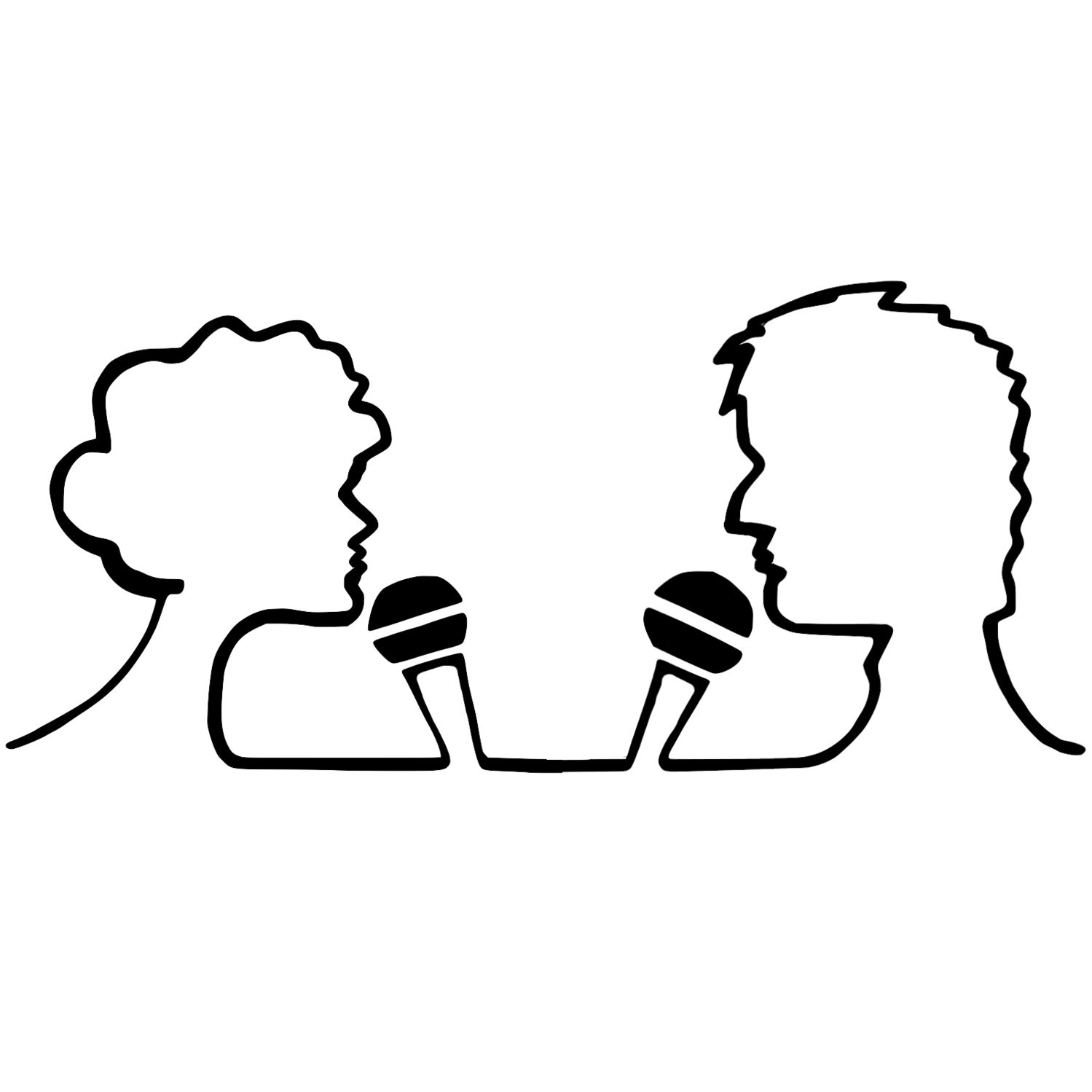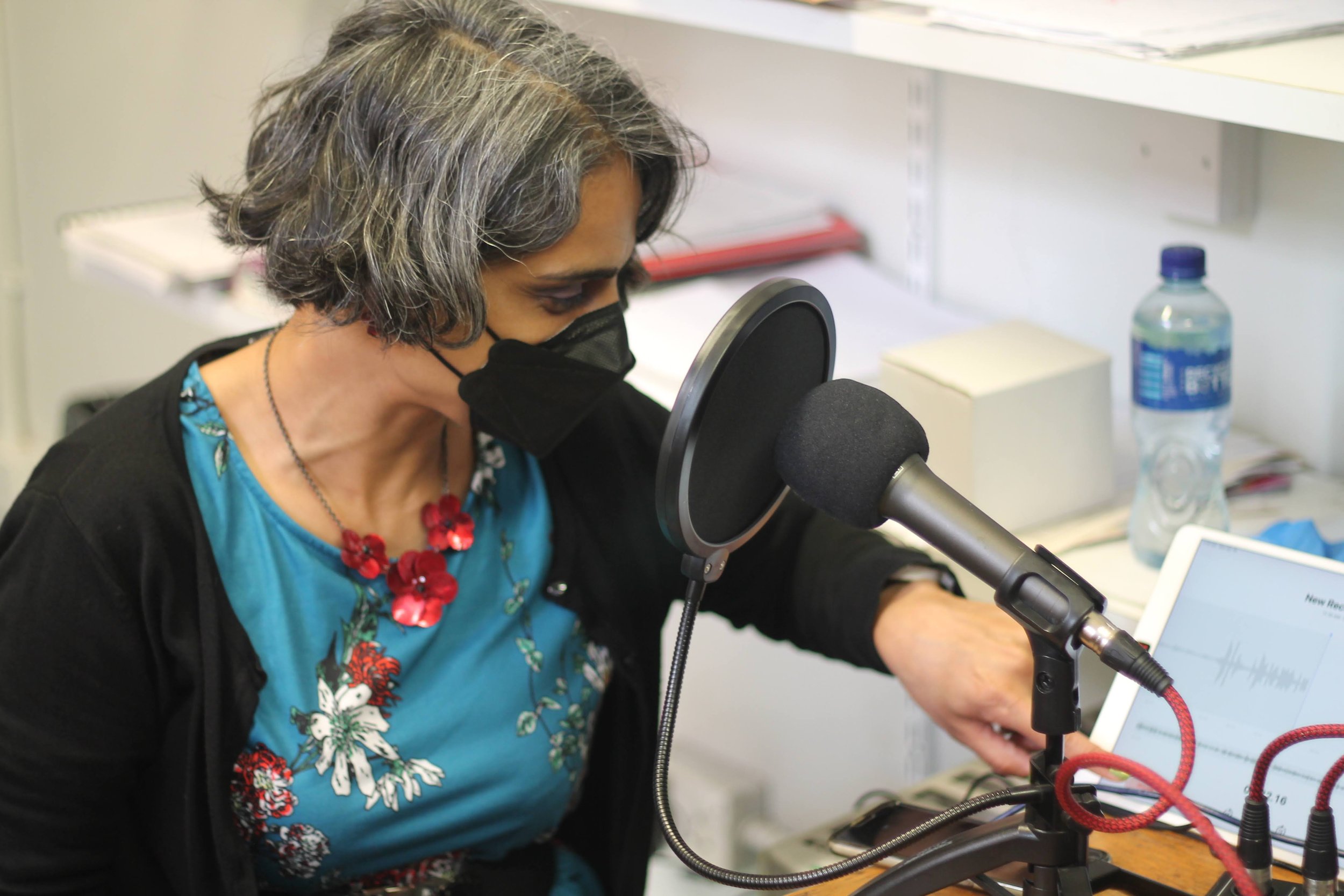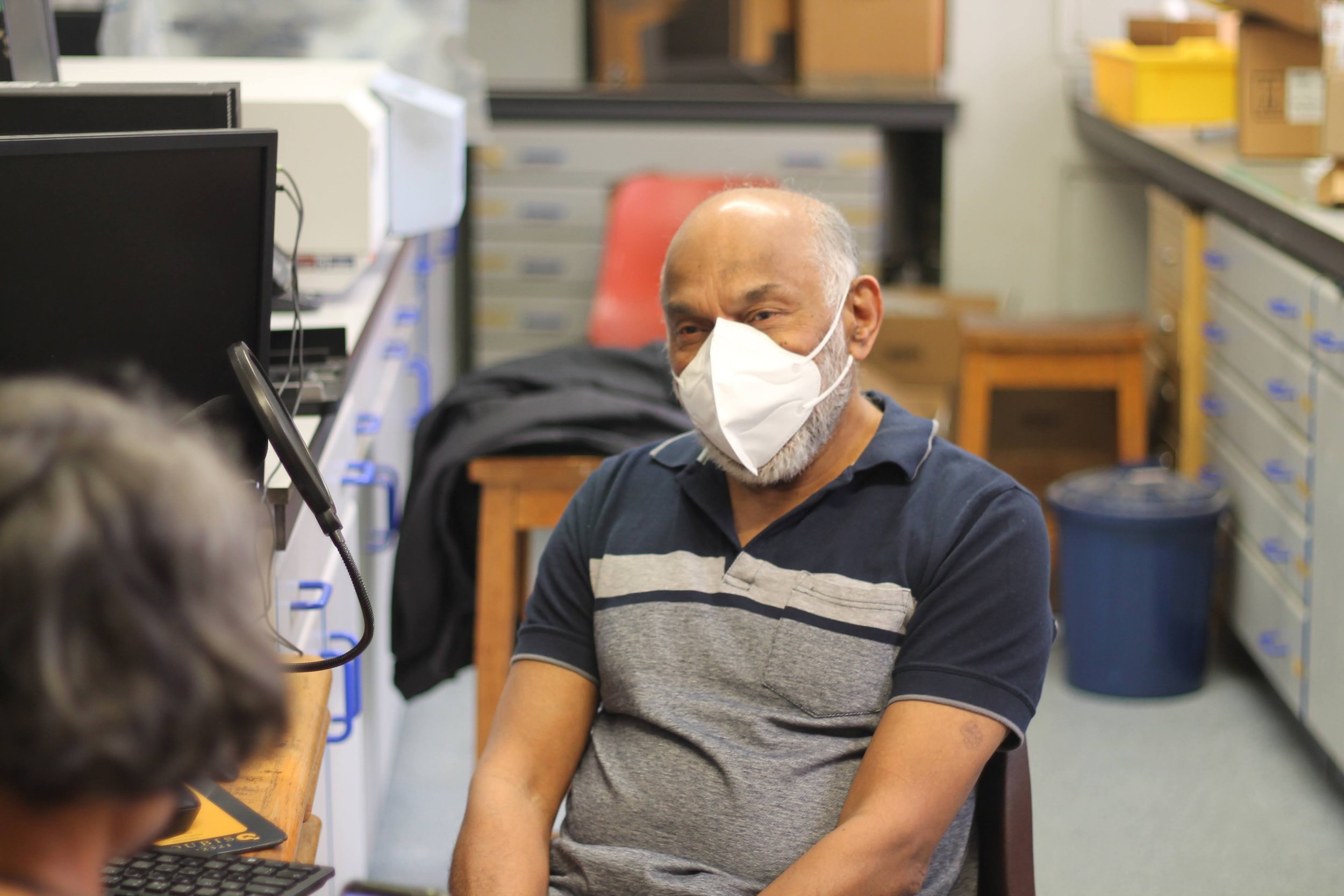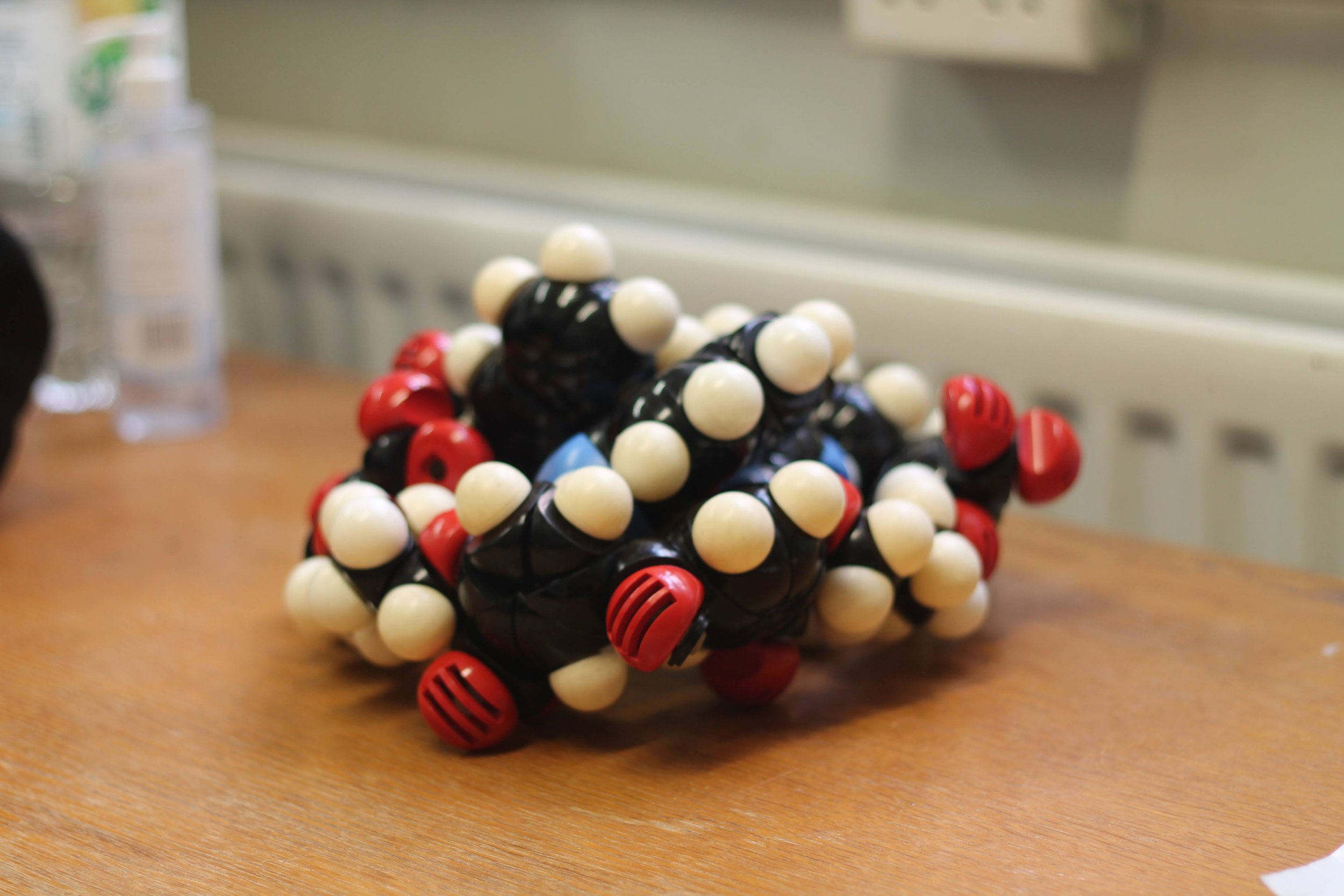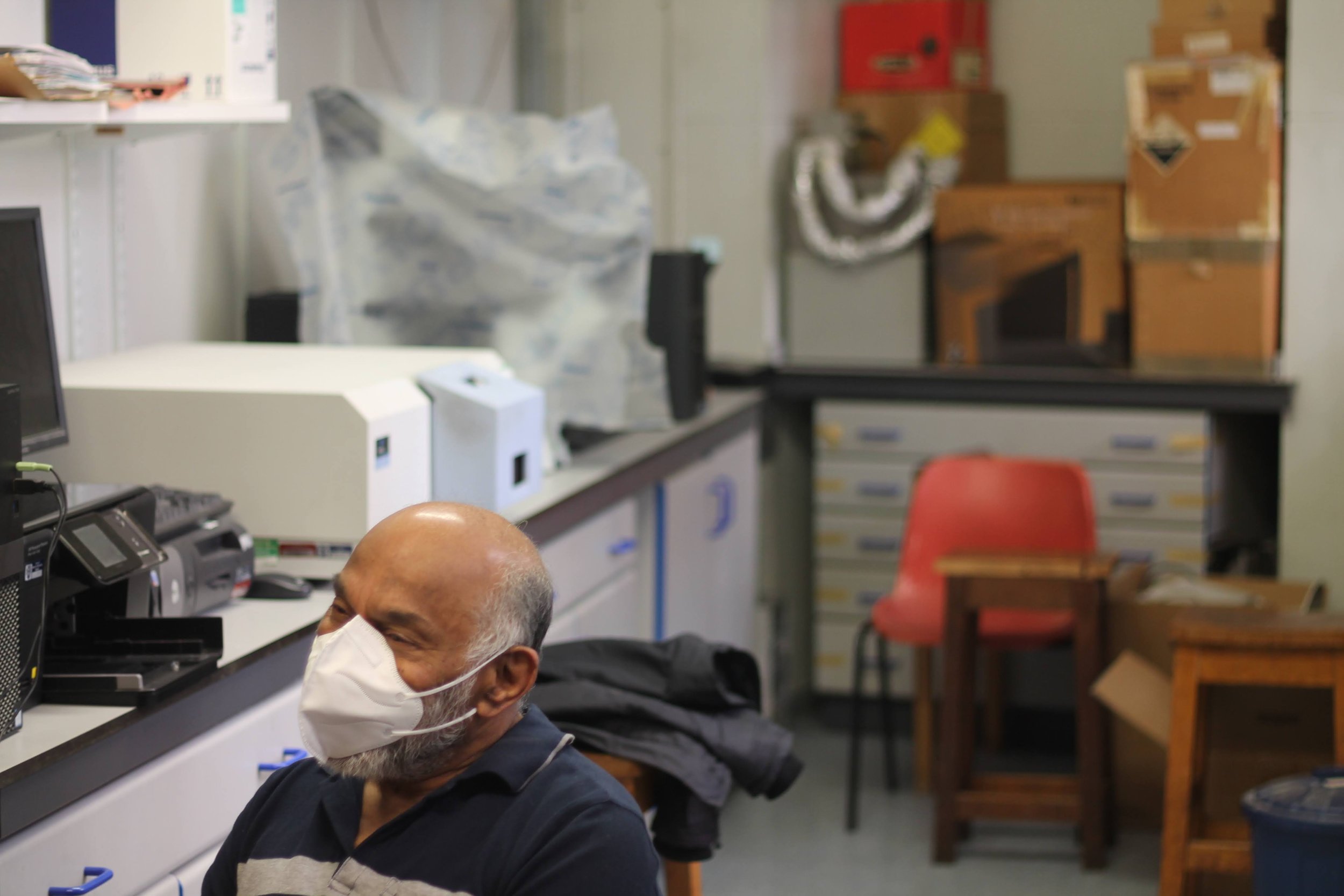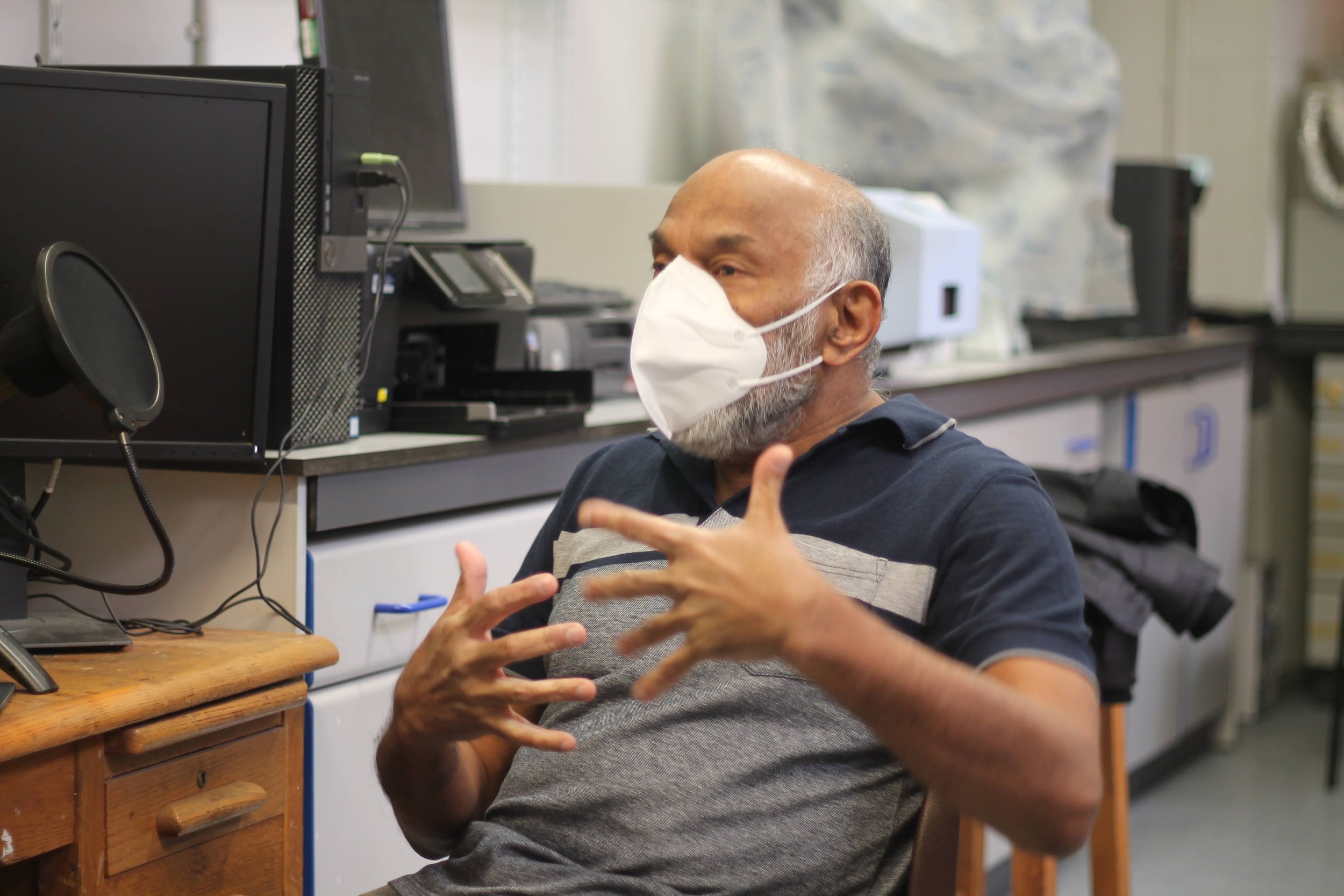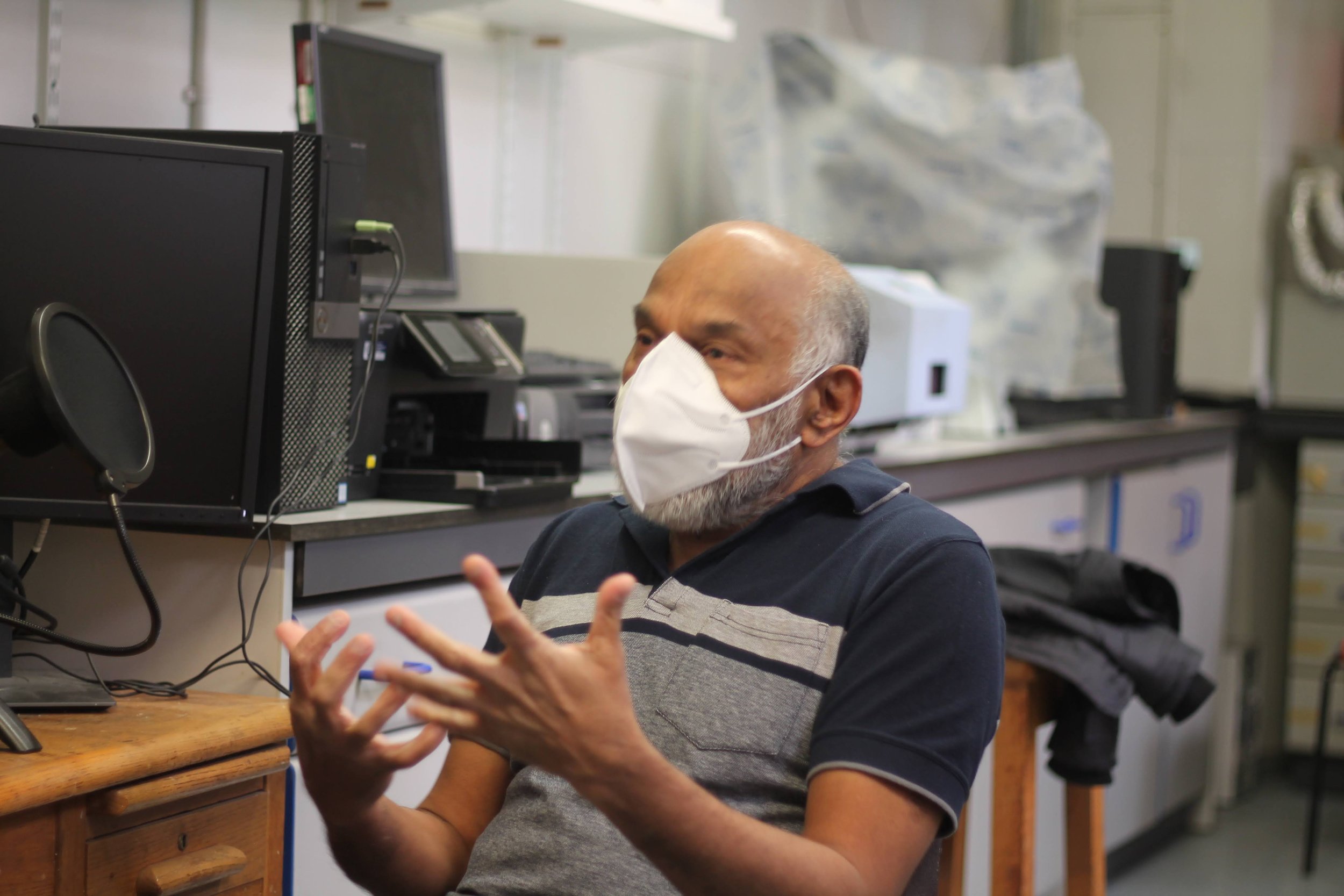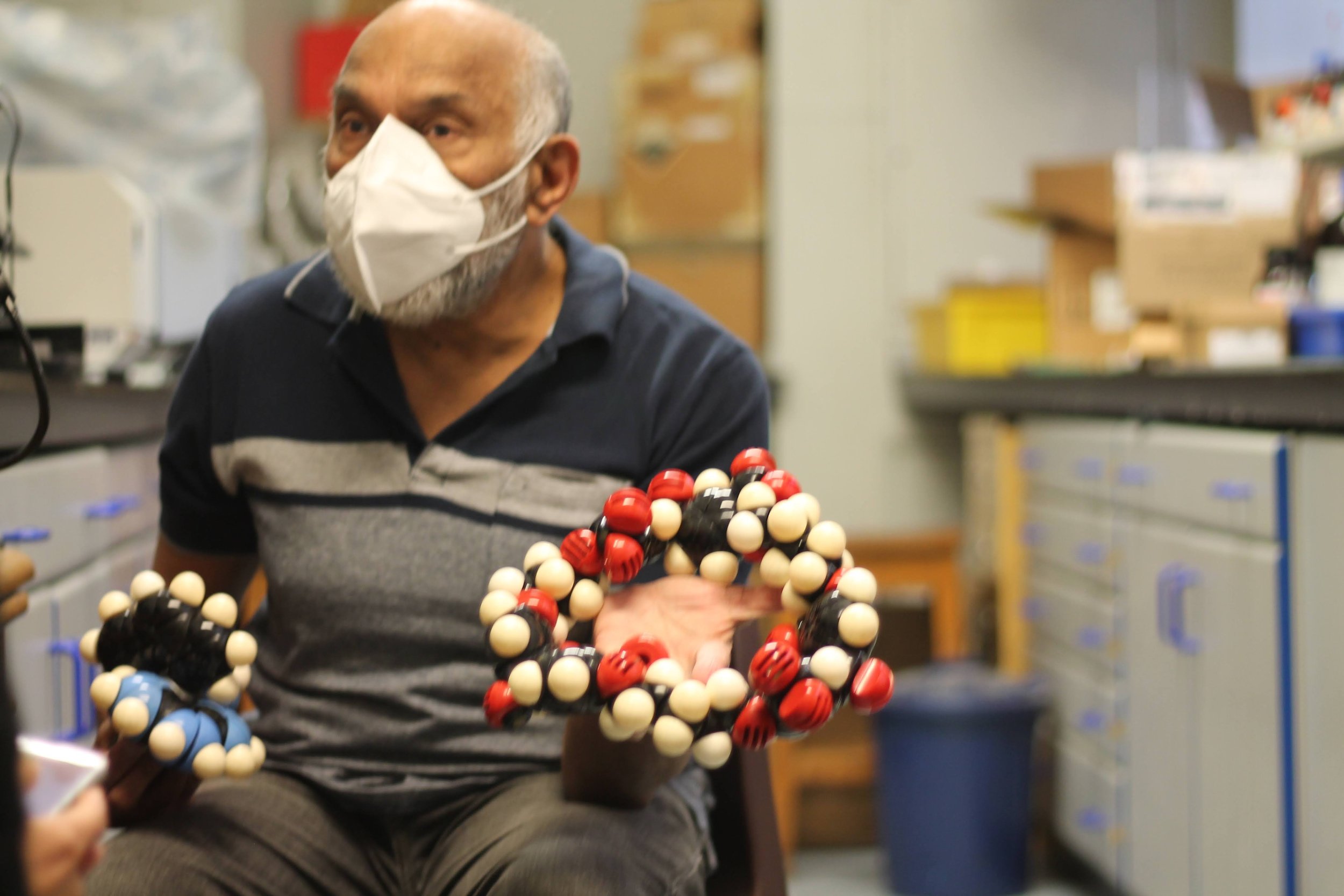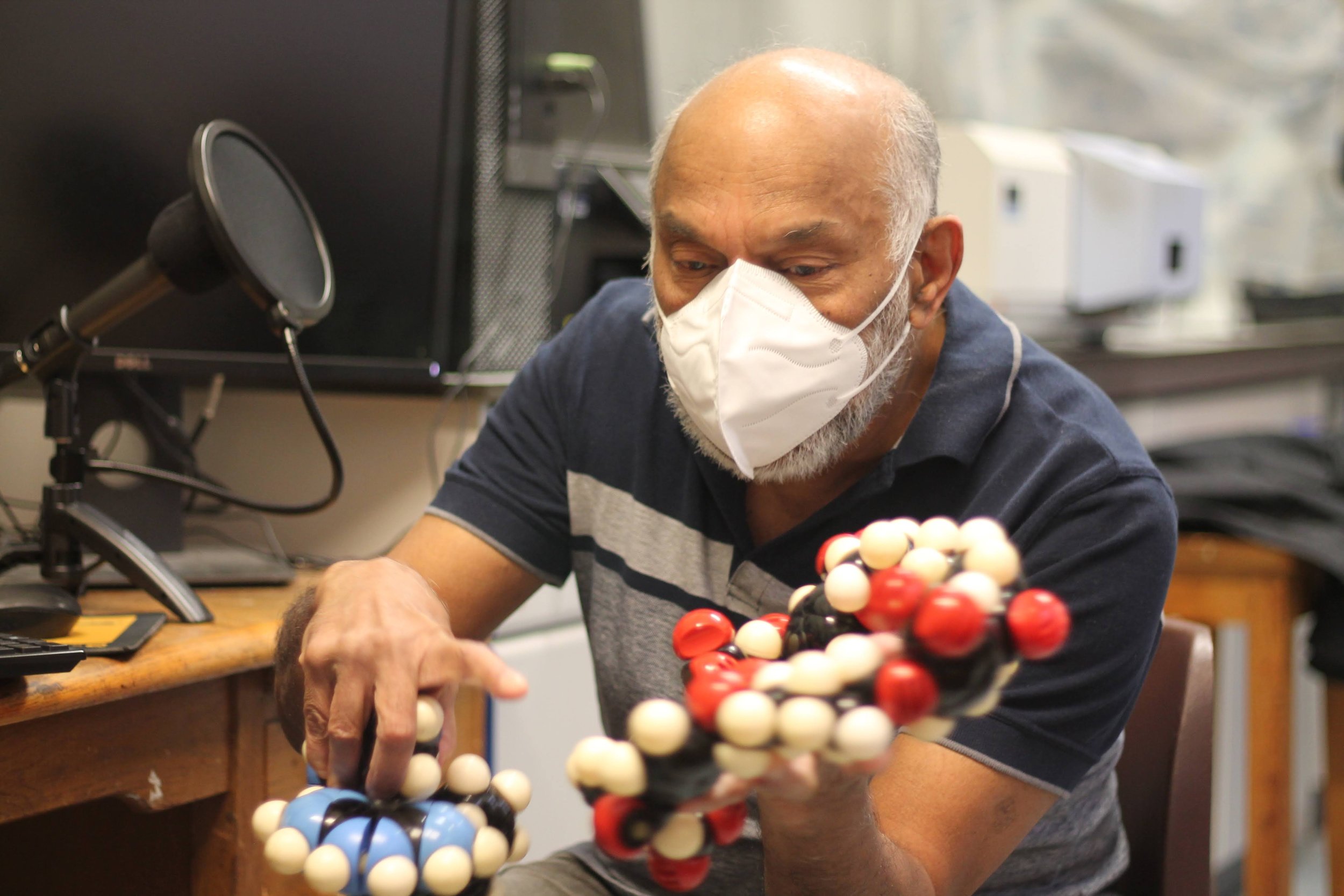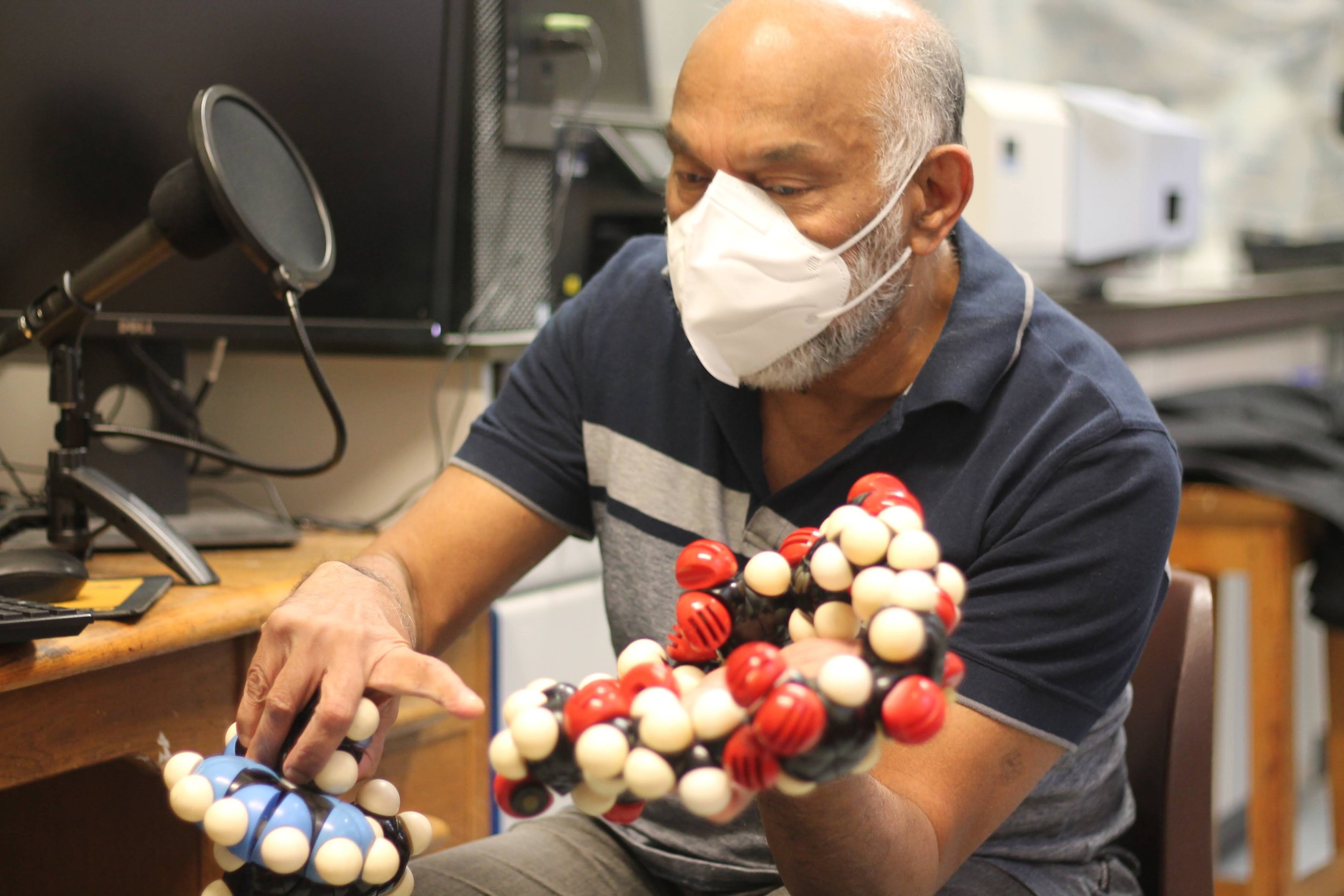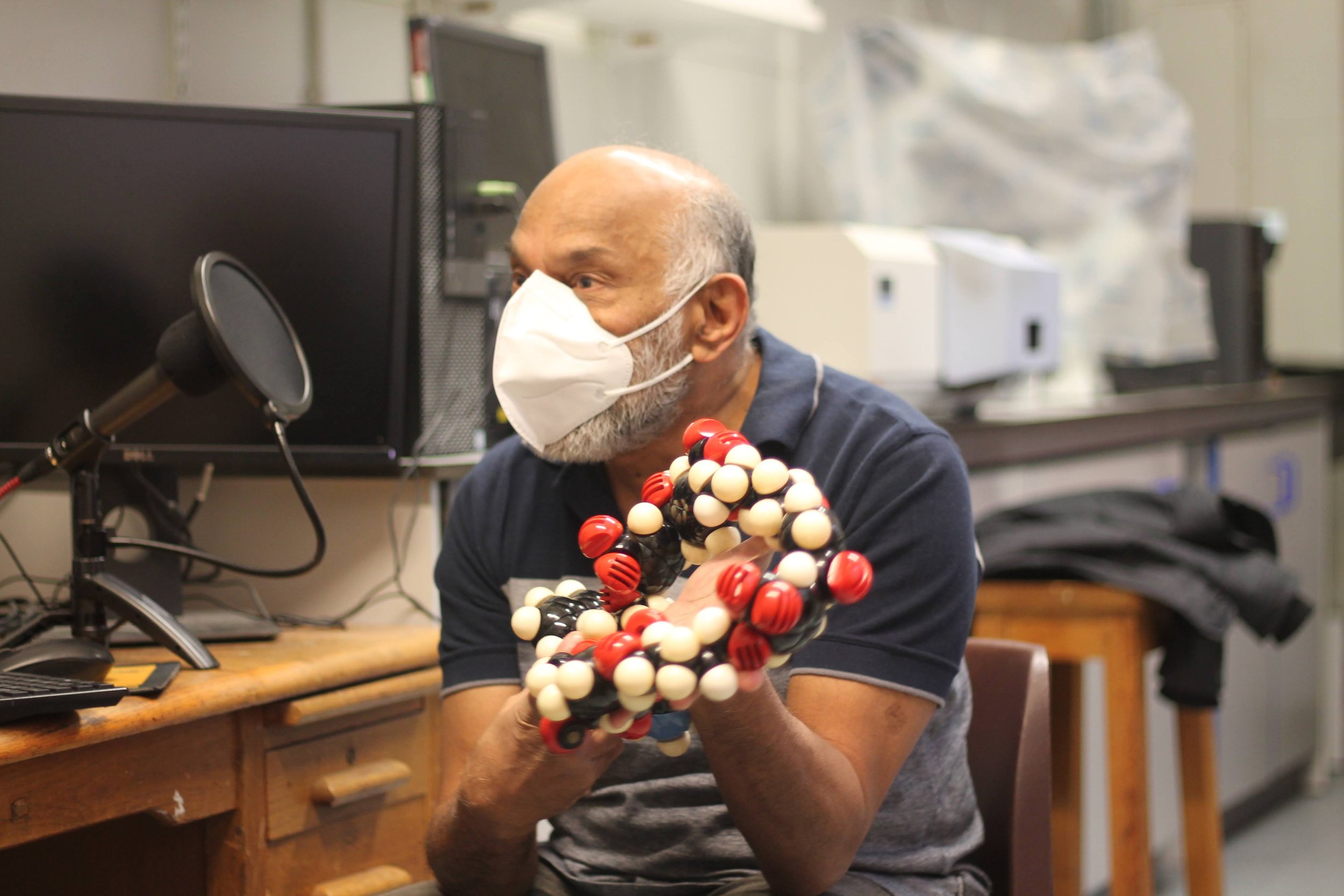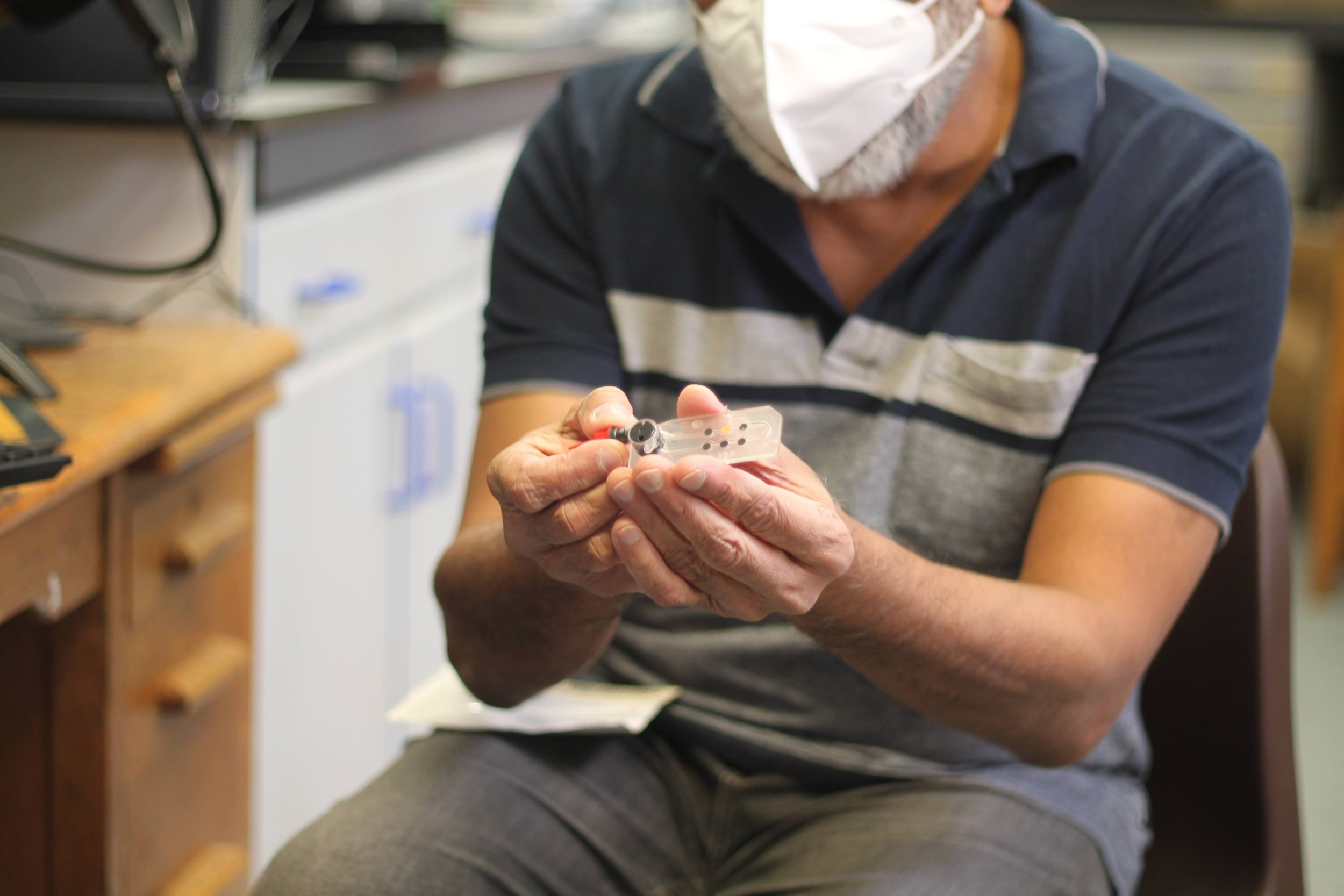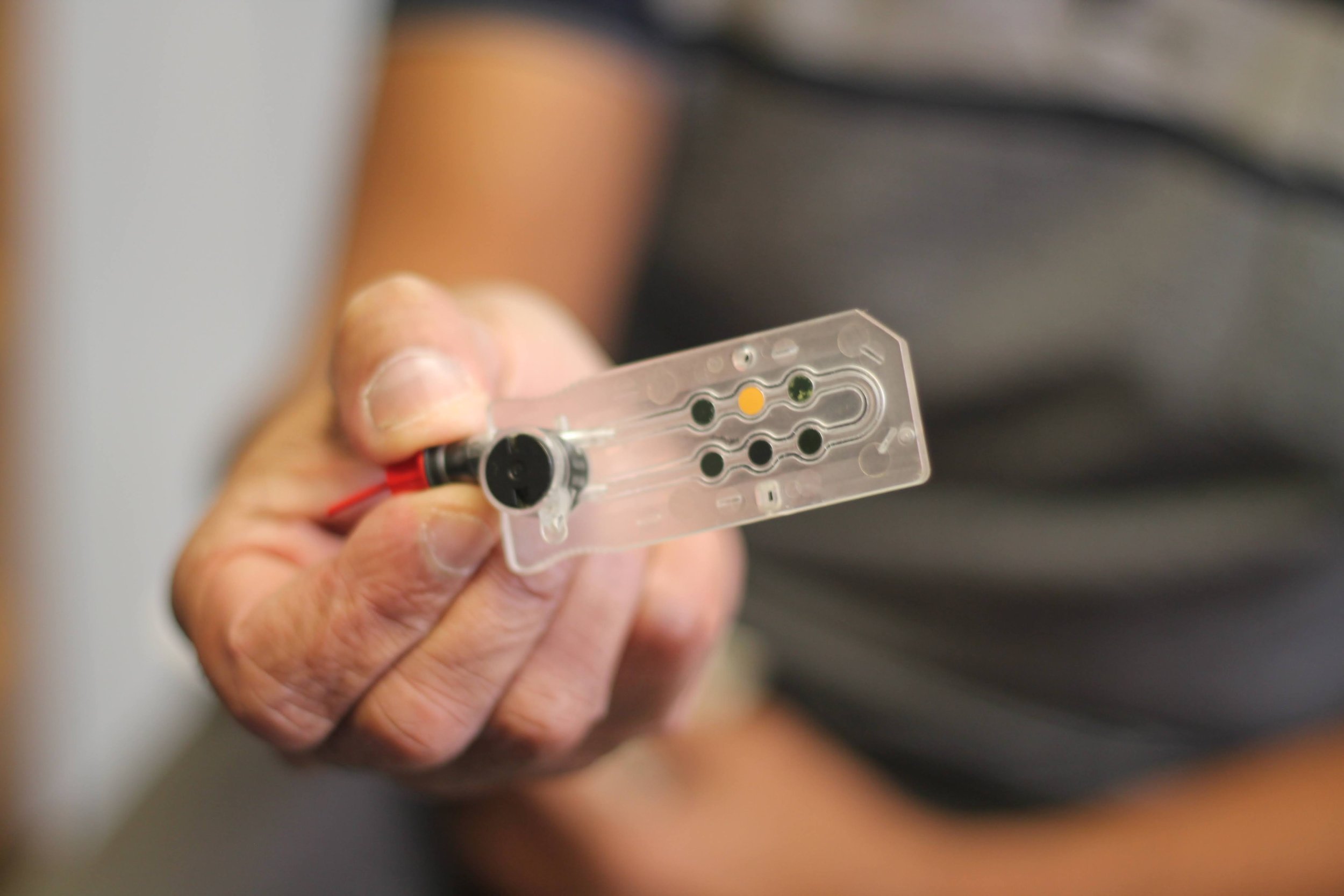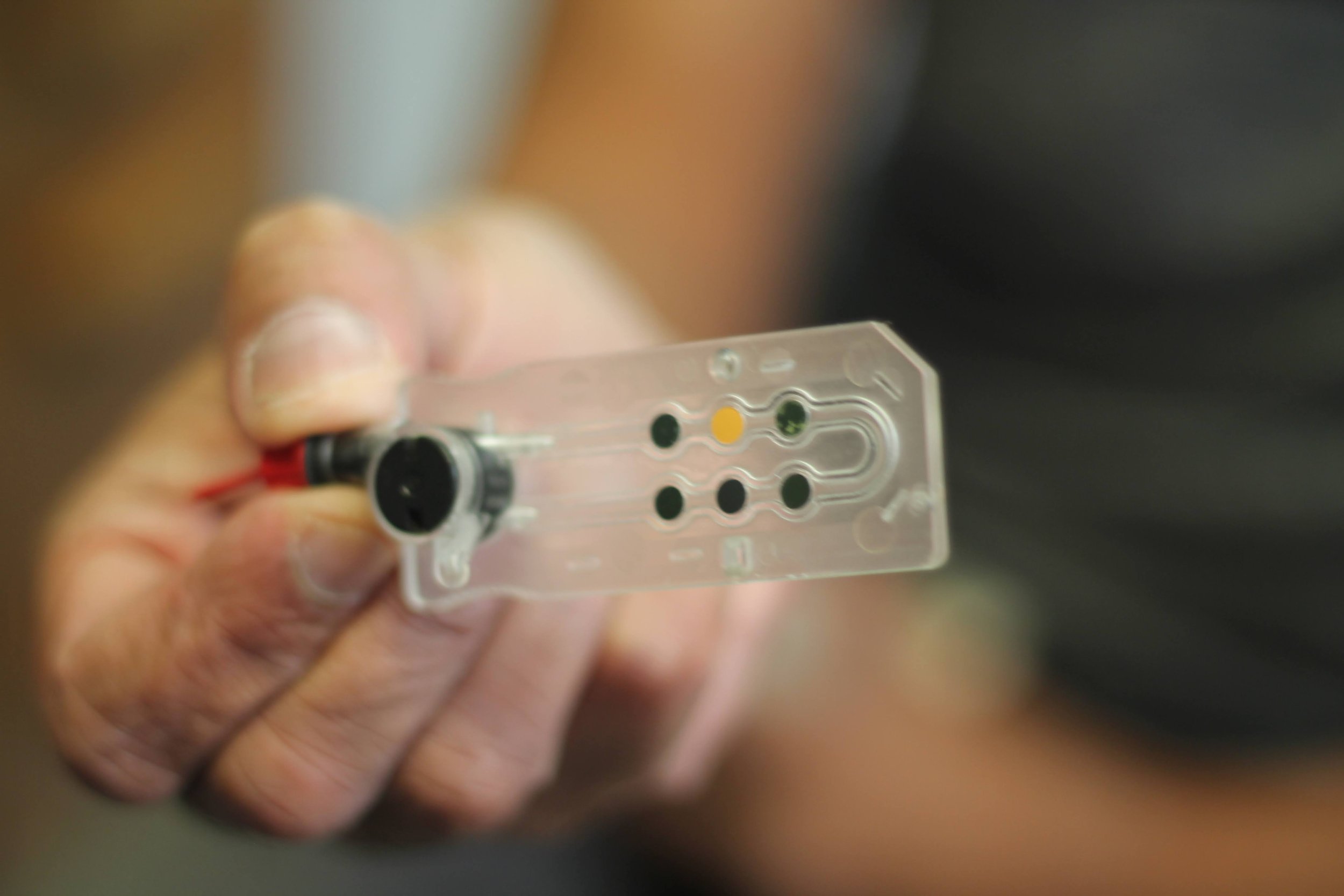Serendipity in chemistry
Chemistry and chemicals get a bad rap, but unfairly so. Certainly that’s the view of Prof. AP De Silva, someone who fell in love with the subject in his native Sri Lanka and who has continued a fruitful career in Northern Ireland.
We talked with him about his humble origins, the happy accidents that led to him moving to Queen’s University, Belfast, and the spiritual side of understanding molecules. We also learned about the life of someone who has experienced civil wars in two different countries, and how his work may have had life-saving impacts, all thanks to a tiny device with 6 little dots.
Outside of science, one of AP's true loves is to play the drums, which he gets to enjoy in the form of Irish percussion. We thank his friends Tara & Dermy Diamond and Dáithí Sproule for allowing us to feature the track The Three Scones of Boxty from their album Seanchairde meaning "Old Friends".
Listen:
Watch:
Subscribe to our YouTube channel now for all future recordings.
Episode transcript
[Background intro music playing is "The Three Scones of Boxty" by Tara & Dermy Diamond and Dáithí Sproule]
Parmvir: Hello, dear listeners. This is your host Parmvir Bahia with David, both of whom are very excited to be recording a 2scientists episode outside the U.S. for the first time in a very long time. Today we have the pleasure of being at Queens University at Belfast, where we are grateful to be speaking with professor AP de Silva.
How are you this lovely morning,
AP: As well as you.
Parmvir: [Laughs] I'm glad to hear that. So normally we would be, recording in a bar or a restaurant somewhere, but, uh, you requested that we pick somewhere that was a bit less public because COVID.
AP: Yeah, because, and I apologize for this. Like I noticed from many of the shows that you've done before you recorded in very live settings.
So today you're having the most dead setting.
Parmvir: Oh not at all, not at all!
AP: But it is because I may be the most geriatric person on your show, which I'm very glad to be. So thank you. Thank you very much for having me, but it just so happens with this pesky virus going around. And with me being particularly prone to this.
Parmvir: Yes
AP: We can chat about it if you like.
And so because of that, I've had to offer you this very sterile environment.
Parmvir: This is absolutely fine, for me, it's always a joy to go and visit other scientists' labs. So it's, it's, it's exciting for me.
AP: Yeah. This is a real place, where actual experiments happen. And I still am a sort of get my hands dirty kind of scientist, even at my extreme age.
And so this is a place where many experiments have taken place.
Parmvir: That's wonderful. Yeah, cause I was a bit scared. I had to leave cells behind to come here and I asked my PI if he would do it and he looked very, very dubious. So I had to get one of my colleagues to do it instead. But for the audience, if they go and look up the photos associated with this particular episode, they'll see us dressed in our finery.
Uh, it just so happens that today, thanks to our lack of time management immediately after this recording, we'll be heading to the wedding of our dear friend, Arturo Araujo. Um, who is fellow co-founder of this podcast and the artist who designed our logo no less. but yes. So AP, maybe you're a little disappointed to find out that we don't dress this fancily for all our guests.
[laughs]
AP: But it's such a lovely chance then to catch both of you at the time when you're looking at your shiniest.
Parmvir: Yes, absolutely Not everybody gets to see us this nicely. But let's start the podcast by talking about your background because you are originally from Sri Lanka. How does one move from there to Northern Ireland? And what inspired you to go into science in the first place?
AP: Yeah, I think it's, for me, I've been Mr. Accidents all along [Parmvir laughs]. So for me, I suppose the story really started in Sri Lanka where my grandfather, I had only one grandfather and he was a primary school teacher and he was also the person who would you introduce literacy to all the children in our little town, as you know, in some parts of the world, literacy is highly valued.
Like I grew up in very poor circumstances, but even in those circumstances, it was always realized that education is the way that you can make something of yourself. And therefore literacy is held in very high regard. In fact, literacy has an initiation ceremony in Sri Lanka.
Parmvir: Oh really?
AP: Yeah. It's quite unusual, like, I've chatted with people from around the world.
And very few societies seem to have that. And in Sri Lanka, we are lucky that the two largest communities in Sri Lanka both have literacy ceremonies, and my grandfather used to conduct these initiations in our little house. And so I had the pleasure of seeing the, since I was a baby. And so it was a great inspiration.
You see youngsters being brought to be introduced to language before you go to school. So to write to basically, and to read. And so it's a really precious thing. It's where the, the teacher takes the writing hand of the child in the writing hand of that person. And then at a selected time, they would write out the first character of the alphabet and say it out loud and the child would repeat.
And I have seen it, it's absolutely magical. And from that moment on the parents who're also present know that their child has a chance in life.
Parmvir: That's so beautiful.
AP: It's beautiful. No less, no less. And so I used to see this as a child and then following from that, I could see that my grandfather, even though we were very poor, that he had R-E-S-P-E-C-T.
You know, people around feel that he's the one who would take their child by the hand in this way and start them out in life. And then as people grow older, they would remember that this is the man who gave them that gateway. And so I was always interested therefore in teaching and learning. And so of course, research now that I do is learning and I get the chance to share it with others and that's the teaching and they teach me too.
And so this cycle is what I'm involved in now. Coming to Belfast of course, was again, accidental, as you can imagine, because Sri Lanka was a small place, and at that time. Sri Lanka was quite peaceful, unlike in more recent times, but because we were a small place, we did not have sufficient teachers in the university, but we were a world British colony.
And therefore the Sri Lankan government would appeal to the British government. You got us into this situation. We don't have enough teachers. Will you send us some?
Parmvir: Yep.
AP: And of course they did. And I'm sure you know, about the British council, it's the culture alarm of the British government. So they sent a teacher to our university to teach chemistry.
He came for one year and he stayed for 20. So he became a national institution and then it so happened that before he came to Sri Lanka, he had worked in a big pharmaceutical company here, which of course is GSK now, at that time they were known as Glaxo.
Parmvir: Yes.
AP: Yeah. And so while he was teaching there, he had looked after a young boy who was washing the bottles in the lab and this person rose to be the professor of chemistry in Queens University Belfast here. And of course at the time, at the time we finished off our bachelor's degrees and I was looking to do postgraduate work somewhere. And of course, nobody would take us because we are from a small place in Sri Lanka. And we were just used to rejection.
And then a friend of mine who is a musician, a better musician than me I must say
Parmvir: [Laughs]
AP: happened to be reading a British cultural magazine in which there was an advertisement for PhD places for foreign students at Queens University in the school of chemistry and chemical engineering. And the advertiser was this professor.
So this is the happy accident. And as you know, Sri Lanka is where the word serendipity comes from. Yeah.
Parmvir: Actually, I did not know that.
AP: Yes, happy accidents. And so when this advertisement was shown to our teacher, he just laughed and said, that's my student. So I'll tell him to take you on. And so my friend came here first and I was the third guy to come.
Parmvir: That's a tremendous story.
AP: It's, this is what you call it, accidents. One little accident. But it's also because my friend who was a chemist as well, but he was a musician. So that's why he was reading this cultural magazine. And then our professor had advertised everywhere because he was desperate because there was a war here.
So foreign students would not come. So he was desperate to get people. And we were really keen on finding out what is this chemistry thing.
Parmvir: Yes.
AP: And so that was the chance for us all. So it's happiness all around really.
Parmvir: Absolutely. Yes. So, I mean, speaking of chemistry, organic chemistry is potentially not one of the sexier subjects.
AP: I agree. I agree. I think again as again, I'm sure you're aware Parmvir and David as well, chemistry has always had bad press. So chemistry as a subject, isn't sexy. Like even if you think of molecules, the atoms put together in patterns, which are all over us, if you ask anyone on the street, they will say, oh, DNA.
So molecule of biology has hijacked that if you like. And again, there, I was really blessed with a high school teacher who taught me chemistry and many generations of Sri Lankans. And one of the messages he got across to us was chemistry. Something that is part of what we can touch and feel and breathe.
And I think that was quite important for me at the time to realize that chemistry is as real as it gets. Like, for example, like I love astronomy type subjects, but it's all far away, but they have very good press officers.
Parmvir: Yes.
AP: Chemistry has somehow failed over the years. And so again, I'm very grateful to both of you for doing things like this, because you are the true ambassadors for the subject, because chemists – working chemists, like you are a working neuroscientist, David, he's a working mathematical biologist, but in chemistry, the problem has been the contact with the media being very poor.
Why you can analyze that further if you like, because chemistry is very real. Chemistry is very applied and therefore chemistry engages with all our lives very strongly. But when it does, it comes into the hand of business people who then obviously have other priorities and then mistakes will happen.
And when the mistakes happen, there is no one then to take the blame except the original chemists. That is my feeling. And again, I've discussed this with journalists like yourself, and many of them felt that "chemical", for example, is such a bad word now.
Parmvir: Yes.
AP: On the other hand, we tend to think of chemistry, even in songs and lyrics. We talk of chemistry as a field between people. So the word chemical is in the dust. And several of the journalists suggested to me earlier that maybe we should replace the word chemical now with molecule and then make a case for it.
Parmvir: Yes.
AP: And which I'm delighted to do. And then to feel that I am just a plastic bag full of molecules
Parmvir: [Laughs loudly]
AP: with a few bones stuck in the middle and that's me. And all those molecules inside me, are able to be choreographed like the best of say, like a concert situation.
And they keep me as me.
Parmvir: Yeah.
AP: For example, I'm sure it's popular around the world. Like L'Oreal would advertise cosmetics to people by saying you're worth it. And yeah, but that word comes from this plastic bag full of molecules. So then molecules can't be bad. And so for me, the feeling has been, if there's something I can do to make a person's life happy, and luckily I have had the pleasure and we can chat a bit more about that. What that enabled us to do is to make molecules to serve this plastic bag from the molecules, which is us.
Parmvir: Yes.
AP: So then chemistry becomes inescapable. And then I suppose it gets as sexy as all people can.
Parmvir: [Laughs]
AP: But somehow that message was missed over the years. And of course now I think even some of these journalists, I'm thinking of, they tried to rephrase the old chemistry language in terms of life itself.
Parmvir: Yes, yes.
AP: Rather than industry, which is maybe one of the mistakes made by the early chemists. For example, in the late 1950s, certainly in the UK, for example, they talked of the white heat of industry and a large part of that industry happened to be chemistry.
So out of that came a big credit at the time, but then the bad things all piled up. And they were laid at the, at the door of the chemical industry at the time. For example, again, this is something from the past, there was a huge corporation called Imperial Chemical Industries and they are dead now.
Parmvir: I mean, it does have all of the magic words that would make you want to load something right
AP: Exactly. All three letters of that. Of course, now they have transformed into other forms and I think AstraZeneca have some parts of it, but you're quite right. You can't get three worse, words in the title. [everyone laughs] So chemists have shot themselves in both feet and both hands really.
Parmvir: Yes. Yeah. So I know we've, we've been talking about this, David and I as, um, that science and scientists have branding issues. And we didn't discover that until maybe the last five years or so, until like more people have been doing science communication and, it never occurred to me, but you're right.
Chemical is a bad word, molecule is a good word.
AP: Is a good word. At once, it is explained because again, one of the joys of coming from the east where, spiritual things are important and religion plays a large part. So for example, molecules, demeanor, remind me of ghosts Of course, many industrialized people will say, oh, now that's very unscientific topic you're on. But my feeling would be that it's very much part of the human experience. And as we go back in time, it played an even larger, or maybe as time goes on, these things will disappear. But there's plenty of people who watch the film Poltergeist and who are scared out of their wits.
Parmvir: Yes.
AP: So it still has an influence on us. And I would use that word measured "ghost". Like a ghost is something you can't see, but it has an influence on you for sure. Molecules are like that. And of course in this case, it's really scary in a way, because this ghost lives inside me, inside me, so I can't get away from it.
And these are nice ghosts.
Parmvir: [Laughs]
AP: They are the ones when you pile them all together, squillions of them together, suddenly there is you. So a smaller part of me is this thing we call a molecule and the molecule is just a pretty pattern of those attributes, which again were talked about by old philosophers, old religions, in fact, Buddhism talks about this and Hinduism has ideas of this.
And so we are touching real human experience then. So for me, there aren't two cultures really. Science, again as Parmvir you'd know from the old languages. Uh, one of the word like the Sanskrit kind of meaning, vidya used to mean just knowing. Knowing that's it. So science wasn't separate from everything else in society. So that's why again the function that you Parmvir and David you are doing now is really vital. It is like making the two cultures become one again. That's what a medium does even with ghosts, you know? So I think that's where, uh, chemistry to me now, as you mentioned, like the sexiness of it should be as the same as the sexiness you'd find in people.
Parmvir: Yeah.
AP: There's no real separation.
And actually, I mean, I think what potentially biologists forget when they're doing their work, is that what you're talking about is so fundamental to ours, like, um, I'm actually trained in pharmacology and that's how molecules affect the body. That's literally what the study is.
Parmvir: And on top of that, you have entire new fields that are trying to create life from scratch. And how do you do that without chemistry.
AP: Starting with the individual the molecules?
Again, if I may give a musical example, I think chemists in many ways are like bass players. We are like, this is where we stand in the background. We get, get alongside the drummer and keep things going. And we are only noticed in a jazz setting where suddenly the trumpet player will say, come on up and do your solo. This guy in the dark, suddenly steps out into the spotlight. There's a few things and then steps back again, and then life just flows on. So chemistry has very much been that.
So as you say, biology tends to forget it. And now I find computer science tends to forget it because I, again, I'm very fortunate to be dabbling in these disciplines from medicine across to computer science. Again, the computer scientists, when we have discussions, like they would say real information processing and computing belongs to us, the industry, and these were some of the, the limits of computation people at IBM that I'm thinking of.
When we first started to show molecules were computing. Those people, I mean they are wonderfully, clever people, earned billions for the companies. They refused to believe that we have computing capabilities inside. I just couldn't understand why they didn't. I suppose to them, the feeling was to be computing, you must have a box, something you can sell a piece of technology. And I would have again offer as a discussion point with your listeners and yourself. The real information technology is not what we buy in a box out of radio shack or places, the real information technology is what you see in the mirror: yourself.
Because when we live, we are continuously taking information and we are computing it and then using it to prosper. What better useful technology, what useful knowledge can their technology being a useful and knowledge? So I suppose again, the way the world works, we have been taken down that commercial road alone rather than saying if people have prospered all these years by using the information around, and surely that is IT? That is my little feeling again, I don't think many people subscribed to that, but then again, I would remind them when I'm walking down the street and if I didn't notice the bus coming towards me, I'll be dead, dead.
And how am I alive now? Because I saw the bus, I heard the bus and I avoided it. I took in information and used it to prosper. That's IT for me.
Parmvir: Yeah. And also given the number of terms that are floating around like neural networks within the field, like how you can have that detachment. It's very interesting.
AP: Yeah, exactly. So I think that's, again, part of the, I suppose the splits that occur, even within science, the engineers tend to feel it's only an engineered product that can be useful. So for me, I said, well, the connection will come back to humanity every time.
Parmvir: Yeah. So you've, you've now started to touch upon the fact that your research is not just one thing. You are clearly working across many, many disciplines. And I'm going to read this out just because in isolation, I understand what these terms mean, but maybe as a paragraph, you're going to have to explain all of this to me. So, you talk about how with your coworkers, you introduce this concept of molecular logic as an experimental field, and, later established the luminescent PET; so that's photo induced, electronic transfer as sensing switching tool. And that you also use chemistry in kind of developing, tools for like this blood gas, electrolyte analyzer, which is, you know, has a very applied use within medicine. Tell us about your research except do so in a way by I can, where I can understand two different elements.
AP: I think you have IQ to burn because I very much come from the point of view that, uh, I am foolish in many, many ways, but that saved me many a time because then I, listen, listen, listen. And if someone is willing to teach me things, I am more than happy to take it in. And so like, as I mentioned earlier, like I had this wonderful chemistry teacher in high school who switched me on to this chemistry, being something that is very human in that way.
And so once it's very human, then any human enterprise should come within it. So the remit is as wide as people can be. And after that, it was just these lovely opportunities. We have people who would come along and say, let's do something. For example, there was in the University of Colombo in Sri Lanka where we studied. And then I was very fortunate because our university was very small that we got to know people from various disciplines. So one of my dearest friends, I still see him every time I go to Sri Lanka, he was a physicist. I like physics, but chemistry was my major. But then when we are playing a bit of basketball badly,
Parmvir: [Laughs]
AP: And then when you're cooling off afterwards, he would tell stories about what he does.
And many of our other friends would say, oh, shut up. We are, we are just cooling off here, we don't want to hear science. And this guy would want to talk about what he's doing for physics. And I would just tell him, tell me. I was more than happy to listen. So, he was the first person who introduced me to real logic gates, which are now used in all computers.
So once I was interested, he would tell me, come across to our lab and I'd show you. So he allowed me to work with my own hands. And for me it was just absolutely like a toy shop because I had never seen these things. And this was like in the 1980s, before computers were common. And so he showed me these things with which you could build a clock, for example, and keep time.
So while I was studying chemistry in bits and pieces, I was picking up little bits of physics along the way. And this friend showed me the power of some of these things. And then it took me ages in my little head slowly for it to suddenly dawn on me that, oh, these logic gates, can we ever make them with molecules?
It took me a long time and that happened here at Queens, at Belfast it's that. So that's how I was able to do the transition from chemistry slowly. I'm a real tortoise kind of. Eventually to see molecules can maybe connect with computers. Like I didn't have the knowledge, even though people had talked that up till then, like people are molecular.
So if people can do information handling like neuroscientists, you know, at the highest level, then somehow molecules are able to do that. But there were no experimental ways of doing it at that time. So it was very much dreamland. And then, and next year is the 30th anniversary. So you've come at a really particular time.
Um, and so here then eventually we were able to build some molecules in a lab which could work as logic gates, like out of your phone, out of your computer.
Parmvir: Can you explain very quickly what a logic gate is?
AP: Oh yeah, with pleasure. And again, maybe I can make as little connection with one of the greatest scientists in all Ireland called George Boole. Boolean methods comes from this man. And so he was from England and he was a mathematician, but he had an interest in classical languages. So he, and this thing of not making two cultures was a real development there because, and then he came to Ireland at the time of the great famine, the great hunger.
And so there were three Queens colleges at the time, Belfast was one. One was in the very south of Ireland in Cork and there was another one in the west in Gallway. So these were the three colleges and they were advertising for staff. He was across in England. He had just qualified as a mathematician and he applied for a job and our university, for some reason, didn't take him.
And he went down to Cork. And God bless Cork. And there was where he started thinking languages are ways in which you transfer information, he's a mathematician. And then he realized that languages can be structured in such a way that you make questions to which the answer can only be yes or no. As we know, lawyers do this for a living, a good living. [Everone laughs].
And so pin you down and say, now tell me Yes or No. That was the binary choices. And so out of these binary choices, George Boole was the guy who had said, languages can be built about zero and one only. So true or false, he replaced by mathematical symbols. And then he said, if you have mathematical symbols, I can manipulate numbers like everybody else does.
And so he was the true revolutionary. And again, I like to point out he did that even a time of a famine in a time of great crisis. And then he came up with this discovery and then his students then realized we can now manipulate these numbers so that, so George wouldn't invent logic, but he invented the binary system.
And then he stood and said, now let's do logic. And as you know, a logic means step wise, operations of anything. So in languages, we will use that to communicate in slow steps. If we don't use slow step, I am either mad or drunk or a poet [everyone laughs]. So James Joyce kind of person would be doing the big leaps. And we don't understand it even now.
So steps, little steps. And then once you had the binary system with only these two numbers, then the steps were the smallest possible. So for example that discovery nearly 30 years ago, that we were able to make was to emulator and logic gate. And so what's an AND logic gate, an AND logic gate is where, two signals come in.
So the signals can be anything again, if I give you a musical example from choir to be a call and response, so the choir master or the lead, soloist puts a line and then the other people come in and suddenly you have a gospel situation developing out of that. So just like a call response, a computer or a phone or molecules that we would use also use this system of call and response, which is input and output.
And then the moment we use inputs and outputs, we tend to use the word signal because it comes and goes just like, you know, a call and response. You just sing your note and then you wait for the other person to sing it back. And so, an AND logic gate was two calls have to come at the same time, and then a response will emerge.
Otherwise it remains quiet. So logic gates have a little bit of cleverness if you will, but they are basically looking for a condition and unless the condition applies, they remain silent. And only when the condition applies, you get the signal. So these AND logic gates were there. Two signals come at the same time, and then can you give a response or otherwise you don't. And of course, this is a very powerful phenomenon, this AND logic function. It's not stuck in a lab at all. For example, here you are going to a wedding. Why are you going to a wedding? Because two people have decided that if they are together, they are going to be happier.
Or if you take the old line United, we stand divided we fall. So it's wonderful that you are going to do anything. And it's because I think love between people is one of the best examples of AND logic. Where, when two are there, something happens. And if it's only one or none, nothing happens at all. And so, because of it, it's a very, like it's from a gut read that even AND logic originates.
And that's why companies and political parties everywhere will use the line United in some kind of way. Here you are representing the United States. This idea union has always been behind social animals and so that's AND logic all along. And so we were able to do that case first and because it was a bit of a celebrity because of this, because of its connection with society in general, because a couples come from their families come from their villages, towns, cities. And so because of that, we were in the happy situation then to get that little break through there. And of course, with molecules, then you will ask where's the call? Where is the response? And then again, it's wonderful that it's you Parmvir who's interviewing because you are the neuroscientist. So you're very used to signals going along the nervous system that, so now I am very much lower down the pecking order where we are just taking molecules floating around in solution, like a little gold fish.
So for example, this is again where thinking of the molecule as a pattern of atoms became very useful to us because at the end, we think of it as the ghost. Then how do you talk to the ghost? The ghost will scare you like hell, but then you've got to make a response to try and take it away. And so with molecules, it's easy to do it with another molecule or atom, but they're all have the same size.
We are just too big. So it's wonderful to arrange a stage on which the molecules can play. And then we watch from a distance and try to get some kind of phonecall from them. So we tend to use light as this medium. So we use this fluorescent idea, like a fluorescent light in our little room here, and like a DayGlo jacket, someone which is a light talking to us, all the light is coming from some source. And then as you know, fluorescence then means for the light to come from that place, you got to supply some light from somewhere else so that the energy is transformed in some kind of way.
So fluorescence always had this power to communicate with small techs. You shine the light in the direction of the molecule, the molecule absorbs, that light. So let's say you shine blue light at something which can absorb that blue light and they need to reply by sending say green light signal. So suddenly I am able to talk to the animals like Sammy Davis, Jr.
Parmvir: [Laughs]
AP: And so now suddenly we can talk with the molecules. And then we've got to tell or instruct the molecule if you like when to send the signal back and when not to send the signal back. And then here again, we were using something so human, we all depend on agriculture.
And as you know, agriculture starts with photosynthesis.
Parmvir: Yeah.
AP: Where light falls on the green plant and makes starch for us to eat and oxygen for us to breathe. So there is that near religious, powerful phenomenon. We are using this same phenomenon because it starts by light falling on the chloroplast and then a little chlorophyll molecule in there will shunt a little electron, this tiny thing from which electricity came, and electronics came, to go from one place to another. This is photo-induced electron transfer (PET). So agriculture starts with this PET. And so that is what we use for a much less grand application, but it's still useful because now we can get the molecule to use up the light energy because it's using the light energy to start a bit of agriculture kind of thing.
So then it has no energy to send back as a light signal. That's our trick. So we use agriculture basically to hijack the molecule. So the molecule has no light to come to us. So this has multiple uses. You can use this directly to measure things and I can give an example in a little while. But then for our logic purpose, it switches a light signal off and on.
So whenever the agriculture happens, it's black as night. When you stop that processing some way, then the light shines at me and I recognize it as a high signal or if it was like a choir, you hear a lovely voice in here, right here. So that's how we were able to talk with the molecules. But then you quite rightly asked as a scientist, how do we get our fingers into this molecule then till it went to shine light or not?
So it's through this electron transfer, but then electrons, as we are well used to in school, electrons have an electric charge. That's why you can get electrocuted and get killed. This charges happens to be a minus charge. It's a negative charge. We tend to use for example, a metal atom. And if you remove an electron from it, then you'll get metal ions like sodium chloride, sodium in salt, which is used in our nervous systems. They are not metal atoms themselves. They are metal atoms stripped of an electron. So they are positive in charge. And this is wonderful because when the metal is positive, if it's close to an electron which plans to leave, it's suddenly quotes Tina Turner [Parmvir and David laugh] and say opposites attract, et cetera.
And so the electron doesn't leave. In other words, electron transfer, this photo-induced electron transfer is controllable by me, or controllable by Ms. Turner. It's controllable that opposites attract. So if you bring a metal ion close to this, electron which tries to move, it doesn't go. And if it doesn't go, the energy's not used up to do agriculture.
And so the light comes out in your face, your face, my face it's face. And so this is what makes this really powerful. So notice we can do two things now. We can get signals from this ghostly underworld, which is all parts of us, so you can watch players of life. So that's the medicine use. And at the same time, now we can command and control these little molecules.
That's where the switching comes and that is where the computing happens. And so then we can give molecular examples of something that happens in a computer or even something that happens in us as people.
Parmvir: Yeah.
AP: So this molecular logic then was done by taking a molecule and giving it two places to receive two metal ions. Why? They, just like in the neuroscience a metal ion can be captured in a place like when sodium potassium signals go down on earth, they are being held and released.
So we can meet those little ones in the lab. And I'm very grateful, David, that you fill in some of the little plastic toys. I think that might be helpful to some of the listeners later that they're taking a look at a photo. Uh, we can make molecules with big holes in them. And so if I may point out the meter on it.
So for example, here is a molecule huge hole in it. Molecules with holes in them is the beginning of neuroscience really. So like the potassium channel and the more famous one. Yes. So this is a, not a channel really, but it's certainly a big hole. And so it's atom, it's a pattern of atoms. One atom, one atom, one atom, you join them altogether to make like a necklace, nearly big enough to put a head in it.
Yep. And then comes this idea of, again, it's wonderful that you are going to a wedding. So here you are having lovely suits. Suits, which fit you because you are going to a wedding. Here is a molecule. If you like, which is a suit again, which fits another guy. And so this guy can go inside. So, so here is one of our very recent ones.
This, this was only published five weeks ago so I'm delighted to share. So, but there are many examples like this, in fact, like one of the early Nobel prizes for this field called supra molecular chemistry. It just basically means a molecule, which is a bit of a superwoman or Superman. So then it's capable of catching another molecule.
So here we are just catching a very special molecule containing a ruthenium, which is a very famous metal. And it's used in a lot of catalysts. So that's this guy here and it fits into here. So this idea of tailored fit, which people have been used to in clothes.
Parmvir: Yep.
AP: And of course, as you know, in enzymology it was very popular in the lock and key thing, but I prefer the tailoring of clothes, like Gucci, because that's what most people would relate to.
And so this is one of those cases. So our AND logic gates were made by something like this to receive a mental ion. So here it's more than a mental ion, it's a bigger thing. But to catch the target. So our AND logic gate was built with two holey places, like one to catch one metal. And then on the other side, it has another hand.
And each of these reads Tina Turner and says, okay, the moment I catch the metal ion, I'll stop an electron from leaving. So then, so this molecule had two sites. Each site was capable of hijacking the light, and now we attack the hijacker in both places. And finally, the light is released when both arrive, so this was, and it's wonderful that we can chat of this now. 30 years ago, this was in the start of saying: here, molecules are now able to emulate some of the properties of the silicon revolution, and then it's gone from there. And now some of the actions we can do now are actual human emulation. So these little molecules in the run down lab that you see here, are able to behave like you Parmvir, like you.
Parmvir: So you have a very kind of, a very lovely and poetic way of talking about your research. But when we're looking around your lab, it feels like the actual experiments you do are probably not as dramatic.
AP: Of course. All we are full of failure. Like our, my, again, my middle name will be failure.
Parmvir: I'm thinking less of the failure and more of the, like the array of chemicals that you have means that the practical side of it is probably very simple, or I don't want to simplify,
AP: But you're right. I think once we learn how to do it, it becomes very simple. And again, if I give the example of again, we were very fortunate to have a lovely application. Like this little plastic chip here is the blood analyzer.
So what this does is, you can take a little bit of blood out of any of us, and then the blood goes in here. And then as you see, it's got a channel, it's got a little channel going all the way around, and there are these six spots here.
Each of these spots just be a piece of paper, basically filter paper that we use in high schools. But as you see, they're black and they're black because, uh, the, we have connected the dye, just like fancy clothes. So for example, this corner one might be looking for sodium only.
Parmvir: Yeah,
AP: So it's got a hole fitting sodium. So it's tailored for, sodium. Then the next one is tailored for potassium in the blood, and the next one is calcium in the blood. So this is the chip that is used around the world. And again, for your listeners, they can just do this at home. Uh, they can just browse on their phone for optimedical.com. It's a spinoff from Roche, the giant and they had a problem to solve. And then they had looked around a few of the journals, and thankfully they had read one of our little papers. You know normally it's only my mummy who reads my papers. [Parmvir and David laugh]. In this case, thankfully the Roche scientists saw it and they came here. And so they had the commercial will and they made it into a product and it's made minimum of half a billion dollars so far that I know of, for this plastic chip and that's, I mean, the accountants won't tell me what happened now, because I was consulting for a while. Now they don't need me anymore. And now this is off patent. So it's made the generics now. And so this is used everywhere Parmvir.
And again, in fact, I can give you an example. Uh, this was used during the civil war in Sri Lanka, by the ambulance crews. And I remain grateful and every time I go, I think about it, you know, because we lost 100,000 lives in Sri Lanka in the civil war. And so the way the ambulance guys use it is the, the chip comes in this little foil pack kind of thing.
And all they do is they go up to the person who they are treating, say, AP minus a hand because I've just been in a suicide bombing situation. And then they'll take a little blood out of the hand. Then they put it into here. And this goes into a little box. Yeah. Maybe like a laptop kind of thing. And then in 30 seconds it will read out the sodium and even count the sodium that is present in my blood.
And this is really crucial. And I didn't know it until these scientists told me. They phone the hospital and they tell the hospital, we are going to bring AP minus his hand. Yeah. And you're going to patch it up. And so they have kind of lost a lot of blood. And so then they prepare a blood bag with the correct amount of sodium. Because otherwise people have different levels of sodium, like different everything. And so if you transfuse the blood with their own level of sodium, you're traumatized, then you, and you'll get shocked and you die. Yeah. And those salt shock doesn't happen anymore because of this. Uh, I remain grateful, you know, so it was wonderful situation where this is used around the world in many situations. Like even that last time in the Ebola epidemic, for example. Frontliners were using these for the initial screens. So we were very fortunate again, to land in hard medicine because the Roche noticed something we had written.
Parmvir: You know, the way you've spoken about my neuroscience background makes it sound a lot cleverer than it is, but the idea that you could produce, something that, you know, has had a tangible impact on people's lives must be tremendous.
AP: Yeah. Oh, it's a wonderful feeling. Like, for example, in Sri Lanka, when I visit, I hope this virus will relax and, I'll be able to go again, is of course sometimes on the street, you see people with injuries, who have recovered now, of course. And I then think to myself, are you one who was saved with this?
Parmvir: Yeah.
AP: Because it was so, because as you know, suicide bombings, like you're standing at a bus stop and suddenly you go boom. And 50 people disappear. And so of course Northern Ireland had its own issues, which I was used to, but they were not suicide bombings.
Parmvir: Yeah.
AP: And so things like this suddenly really brought the humanity of science to me again.
And so I feel very fortunate that Roche chose, like you chose to come, thank you again. And Roche chose to come. And because they chose to come and then we were able to discuss, and then I remember them telling me, we don't need you, but we want you be good. Because I'm foolish enough to publish. As scientists we do this, we write about what we have discovered. And so that's how Roche participated. So it was very fortunate there on the one hand to think about computer science things of which I have no massive application to give you. Though I offered it to Roche, but Roche said oh, we are happy with this, We don't want to make it complicated. So we'll keep it like this.
But even there, there was a relevance. Maybe we can discuss. In fact, this became quite important after the Boston bombing. Uh, because at that time I was very fortunate that a friend of mine in Tufts university, he did a couple of trials with the Massachusetts general hospital for situations of possible bio-terrorism using an idea from here . What you saw is we are measuring sodium alone in one spot those black spots you saw, and then potassium in the next spot. Of course, in the box, it can all be measured, but what they wanted was a quick and dirty screen. So at that time, we, I remember we used the word "epidemic" as a situation where health services will be under pressure.
So you can't all go to the hospital, but you should be able to do something quickly outside the hospital. And so the Mass General what they did is they ran a trial assuming what would happen if there was bioterrorism where the terrorist is not carrying a gun or a bomb, but the person is just ill, deliberately made ill.
So people had thought of these things and they're grateful to participate in some of the discussions. And then what they imagined is imagine a person. So the Boston bombing, made it to really real at the time, because then you imagine somebody just riding the subway up and down, up and down and coughing.
And that person does as much damage as someone with a bomb. And so what the trial, they ran was somebody with TB who is going to infect half of Boston kind of thing. So they did the trials for AND logic to look for two things. So in that trial, what they tried to do was to imagine somebody with TB and then they wanted to see they were thinking of this false positive situation, which we are so used to now.
So they wanted to see, the person may have say on their body somewhere, they have the TB bacterium has land, but then they looked for an interleukin response from the person. Then the person is perhaps infected. So they were looking for like a blood test situation where you're looking for is the bug there and is the response there.
So maybe you are like, and if you've got a positive from that, then that person should be tested more rigorously by a medical person. So we're very grateful they tried that. So at that time we called it a lab on a molecule kind of idea. So the lab on a molecule was where the molecule performs almost allthe functions.
So it's a bit like a pregnancy test. Now, or the lateral flow test now. Where the testing is done by, everything is done on the chip based thing. So that was again something which didn't go as far as this electrolyte analyzer I showed you now, but it has the chance to do that because it's all laid out. It's all published there now. So these are some of the pleasures I've had to take little bit of chemistry to human situations.
Parmvir: Yeah, that's wonderful. I have to say it makes me a bit jealous, for people who do much more kind of, at least in our case, very basic science, these days.
And we were talking earlier, before we started the podcast, about the fact that you obviously, you need some degree of funding to be able to carry out science and how do we translate this value into something that people are going to appreciate that we need funding for?
Because I think a lot of people think that, oh, philanthropy is going to fix this, which they have no idea that that money is a drop in the bucket.
AP: Yeah. I can only give you my little experiences for this Parmvir, which was that, uh, like in the Sri Lankan context where all these ideas seeded really we had absolutely no support. Meaning, there were no government funding agencies at the time. Indeed this was in the mid eighties now to remind you how old I am, but at that time there were no resources except what was, you know, teaching laboratory meaning the university had a role or responsibility to educate the population.
And so they had to buy in chemicals, if you like to use the word, which are there to train people, to do chemistry and then go around the world really is what happened. But when they do that, these are labs, which have some funding from government, nothing else. And then of course the biggest wealth we had in Sri Lanka was bright people who were enthusiastic because they, again believed in this principle that education was something which is valuable because you can do things with it later, for example, if you were poor and you will be less poor. And so this drive was present within people. And so then the basic needs for smaller scale research as I tried to mention, mine is that even now the essentials were there. So for example, I would just go and ask friends in other universities, do you happen to have this particular chemical?
And they would have a bottle and they would gladly give them to me because otherwise it would be just sitting there. Yeah. And so they felt, we are not using it for our teaching classes and you have a need for it. Go ahead. And I even had cases of it so happened, there was a Sri Lankan scientist who helped in analyzing the moon rocks from the program. And he worked at the University of Maryland. And so whenever he would come to Sri Lanka, he would bring things in his bags.
Parmvir: [Laughs]
AP: So there were little things like this. We would tell a story. So nowadays you would call it a pitch for funds.
Parmvir: Yes.
AP: They're just chatting like we are now. And then those people would say, yeah, I think I can find that. And this guy had his own funds from the National Science Foundation in America. And this was a few dollars and he would just bring a couple of little bottles for me. Now, nowadays you couldn't do that maybe with drug situation. And he brought these for me. And then along with these wonderful, really enthusiastic young folks, then we could get together and somehow get it to some level of function.
And then I'm very grateful that some of those were published, then. With difficulty of course In fact, like the Royal Society of Chemistry editors used to laugh at me later, saying AP we remember your hand written manuscripts, because that's all I had, but I was telling my story as best as I could. And so science for me has always been a very sticks and sealing wax, kind of enterprise, it was verylow scale.
But then when we have the philosophical platform, which I very much trusted, like this is worthwhile. So it's almost a sense of mission, you know, like that something valuable can come out of this. Maybe not, like I never dreamt, we will have a blood analyzer, but I would have dreamed that this science will be useful knowledge with it.
So it goes back to my grandfather. So it's in that way, that Sri Lanka worked with zero resources you might say, but we had these most valuable resource of all. It's like wonderful people over work, coming in to do things. And in Northern Ireland, I found the same all over again.
Again, it was a war situation. And then there were these wonderfully talented people who were, who chose to come. So it was really wonderful. And then the government at the time had this policy that we must put aside some money for tertiary education. Now that's been degraded since that time, but over the years, I've been very grateful for the 30, 35 or so people who chose to do their PhDs with me.
And that was the level of funding. And so we are sometimes helped by philanthropy type of organizations. Like most recently the Unilever Foundation, there's a Leverhulme Trust in the UK. And so they helped me for this most recent program. And then the UK government has a smaller funding body, which is a bit like the National Science Foundation in the states. And I was very grateful for their support. And so like that there've been little bits of support financially, but the most important thing was like the platform was solid. So a well-founded lab. So like around this lab, even though it's old, I'll have a few things. A few machines to measure fluorescence, basically and a microscope to do that and things.
So those came from government sources at various times. So very much like the NSF system, we'd write a grant proposal and hope for the best and occasionally it's funded. But it didn't matter when even the funding didn't arise in a given couple of years. So I never felt that pressure, honestly, because life had more complexities.
So as long as there were young people who were willing to come and give three years of the prime of their lives, I've never forgotten. They had the whole world at their feet and they suddenly say, AP I'm going to come and spend three years with you. How lucky am I? That was it, you know, so I think that energy, I think, carried us through in many cases.
And as you see most of the time, Parmvir, we are trying to do proof of principle and when we come from, the philosophical position, then we can demonstrate it with the minimum recall. So like AND logic, we need a molecule with two holes in it to catch two different atoms. And then we sing Tina Turner really loud and hope it works.
And that's what happened. So that because of that, our research is not sophisticated technically.
Parmvir: Yeah.
AP: I hope it has some level of value in the philosophical position. So to realize, like to talk to a molecule, you have to think of it as a ghost and then like that. So once you do that, then you can minimize the requirement of technicality.
So that's how I've survived so long I think.
Parmvir: Well, we hope you to continue to survive a lot longer. It's been an absolute pleasure speaking with you. Honestly, we could have stayed here for much, much longer to keep talking.
AP: You have a wedding to go to.
Parmvir: Yes we do have a wedding to go to, unfortunately. But yes so thank you again for sharing your time with us and your lab and your efforts.
AP: Absolute pleasure. Thank you, both David and Parmvir. Thank you.
[musical interlude]
The best ideas I had, was under a coconut tree in the middle of a civil war.
AP: Now it may not be dirt in the normal definition, but this is dirt in the sense of soil life. And this was a time when I was also one of the principal carers for my grandmother. So you would think that is the most unsuitable situation to have science discovery: a full blown war and, an ill person who I dearly loved who needed to be looked after, and then in the surroundings, which is resource poor by most definitions and out of that came everything I spoke to you today.
And so if that's dirt, God, give me more.
[musical outro]
